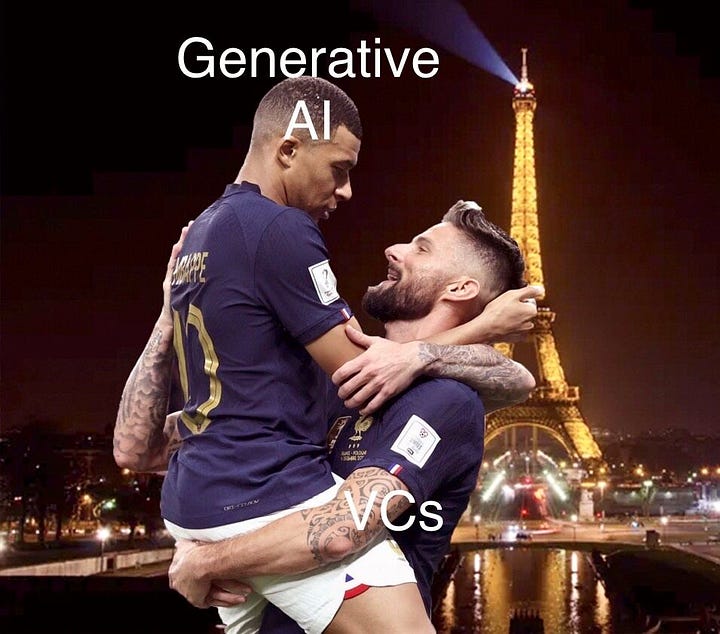The holy grail of AI: the promise of building a truly intelligent machine
What is Artificial General Intelligence (AGI)? Is it already here? What can we expect from AGI-based startups in the coming 5 years?
Editors note: The release of OpenAI's ChatGPT marked a significant moment in the development and democratisation of AI (and on the LinkedIn feeds of VCs 🤭).


It’s self evident that the natural language interface is a game changer. It allows for anyone to experience the power of AI by simply prompting it with normal English language queries 🤯. The possibilities are endless, indeed. And that’s super exciting.
But here at EUVC, we wanted to dive deeper 🤿 and understand this a bit better. So we asked our dear friend Ramon Vigdor, General Partner at Acrobator to enlighten us a bit more on the promise of building a truly intelligent machine.
So what is Artificial General Intelligence AI?
As the current definition goes, a machine having AGI would be able to understand or learn any intellectual task that a human can 🤔. It is a somewhat narrower definition than Strong AI, which also includes consciousness in its bag of tricks.

Another fascinating note on AGI is that, to this date, there is no test we could all agree on for ruling, grading, or even ranking a software agent on the level of generality of its intelligence.
The best we could come up with to this point, beyond task-specific tests, is to carry on a conversation with it and get a very subjective feel on how intelligent it is. And this test was already proposed by Alan Turing in 1950 who called it The Imitation Game. And so, indeed, excluding training and testing on specific knowledge, AGI researchers are spending splendid nights chatting with their algorithms in an attempt to gain at least some insight into their inner workings.
Why is AGI interesting?
I mean beyond the fascinating philosophy of artificial cognition, why the hell should we even care?
Because the media is full of the success stories of AGI - of machines that think. Let’s take a look at a very short list of what an AGI agent would be capable of:
Autonomously learn how to use, control (and more importantly, understand the purpose of) any home appliance, industrial machine, and transport vehicle;
Converse with humans 🗣 on anything at a human level, and possibly beyond - being wiser and less biased than its flesh and blood creators;
Be able to creatively 💡 design new machines, algorithms, and processes, that are potentially far beyond our capability;
Solve the toughest mathematical problems 🔢;
Do anything you can possibly think of (including your worst nightmares of algorithms taking over the world from us, which I’ve chosen to leave out of scope, at least for now 👹).

So what’s in it for us?
To a world hungry to discover new technologies able to revolutionise markets, this is indeed the holy grail 🏆. And dozens of research centers with huge budgets around the world are pushing hard at cracking AGI, or at least reaching out to the promised fruit hanging low enough for productising. Speaking of which, and without mentioning any names, what is actually the state of the art of AGI? And in which AGI startup should we invest?
Well, that is the point of this whole reflection - the fact that, to date, no computer model has even gotten close to actually understanding anything, let alone possessing anything that can be called general intelligence 🧠. Even though specific and highly complex problems are now being tackled that just a few years ago were nearly beyond imagination (e.g. controlling nuclear processes, predicting protein shapes), these tasks are specific and restricted to a confined area of expertise.
The promise of thinking machines is a very long-term investment, to say the least.
⚠️ Beware of any startup boasting that their piece of software can understand, think, or see the point or purpose of anything.
🛑 Stay away from founders who explain the amazing future capabilities of their products through the magic words of Artificial Intelligence.
📣 Don’t let the media hype fool you on machines that think. They don’t.
We are still very far away from AGI. For the next few years, all we should aim for in this context is finding those driven deep tech teams that build specific solutions to specific problems, based on well-defined 'definitions of done'.
Thx for reading and being awesome 💗 we love you for it.






What you are looking for is called Knowledge Graph, labeling knowledge and linking knowledge to something you can interact with with NLP or your API / goto A* .... So you can query complex questions and get good answers. Understanding the "why" and where it comes from, without the need of humans building it, just throw data at it, get graph back.
Glad you understand the importance of it. We built it, you can test it: www.databorg.ai
Looking for seed round btw :)